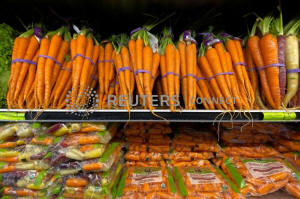Coronavirus spreads among fruit and vegetable packers, worrying U.S.
officials
 Send a link to a friend
Send a link to a friend
 [June 11, 2020]
By Mica Rosenberg, Kristina Cooke and Christopher Walljasper [June 11, 2020]
By Mica Rosenberg, Kristina Cooke and Christopher Walljasper
NEW YORK/LOS ANGELES/CHICAGO (Reuters) -
From apple packing houses in Washington state to farm workers in Florida
and a California county known as "the world's salad bowl," outbreaks of
the novel coronavirus are emerging at U.S. fruit and vegetable farms and
packing plants.
A rising number of sick farm and packing house workers comes after
thousands of meat plant employees contracted the virus and could lead to
more labor shortages and a fresh wave of disruption to U.S. food
production.
The Trump administration said last month it may extend an executive
order to keep meat plants operating to fruit and vegetable producers as
well, a sign it is concerned fresh produce could be the next sector hit.
While social distancing can be more easily implemented for workers
harvesting fruits and vegetables in fields and working outside may
reduce some risks for virus spread, plants that package foods such as
apples and carrots resemble the elbow-to-elbow conditions that
contributed to outbreaks at U.S. meat packing plants.
By late May, there were more than 600 cases of COVID-19 among
agricultural workers in Yakima County, Washington. Of those, 62% were
workers in the apple industry and other packing operations or
warehouses, according to a Reuters review of data from county health
officials.

With 4,834 known cases as of June 10, the county had the highest
per-capita infection rate on the West Coast.
"The (production) line moves super fast. And you're working side by side
and back to back," said Edgar Franks, political director with local
farmworker union Familias Unidas por la Justicia in Washington state.
Workers at six fruit packing sites in Yakima County went on strike in
May due to concerns they were not being provided adequate protection
from COVID-19, Franks said.
The health department in Monterrey County, California, known as "the
world's salad bowl" for its sprawling vegetable farms, reported 247
agricultural workers had tested positive for coronavirus as of June 5,
39% of county's total cases. Monterrey is one of only a handful of
health departments in nearly 30 of the largest U.S. fruit and vegetable
producing counties that tracks virus cases among agricultural workers,
Reuters found.
In adjacent Kern county, Martin Baca, a 53 year-old forklift operator at
carrot grower Grimmway Farms died on April 30, according to his
obituary. His family said they believe he contracted the virus at work.
Grimmway grieved the loss of an employee and was supporting the family,
a spokesperson said. The company said it did not definitively know where
Baca contracted COVID-19.
Grimmway is the largest carrot producer in the world and dominates the
market of popular packaged "baby carrots," for snacking.
Juan, a Grimmway employee who asked to be identified only by his first
name out of fear of losing his job, said at one point so many workers
were out sick his shift dwindled to a third of the needed workers.
"They made some announcements to stay six feet apart but that's
basically impossible when you are loading boxes onto the same pallet,"
said Juan, who tested positive for coronavirus himself though he showed
no symptoms. "Obviously you are going to be close to your co-workers."
[to top of second column]
|

Fresh carrots are shown for sale at a grocery store in Del Mar,
California, U.S. June 3, 2020. Picture taken June 3, 2020.
REUTERS/Mike Blake

Grimmway declined to say how many workers had tested positive for
the virus and said it has seen no issues of absenteeism. When a
worker falls ill, the company talks to everyone working on that
particular shift or department and offers company-funded COVID
testing, Grimmway said in a statement.
'GET AHEAD OF THIS'
On May 19 the U.S. Agriculture Department and Food and Drug
Administration said the government could use the Defense Production
Act to keep fruit and vegetable lines moving. The act would give
companies some liability protection if workers fall sick.
An FDA spokesperson said the act could be used "to protect the food
supply and prevent significant food shortages."
U.S. Senator Debbie Stabenow, a Michigan Democrat, said in an
interview with Reuters farm workers face increased risks as fruits
like apples and cherries enter harvest season.
Stabenow, ranking member on the Senate Agriculture Committee,
introduced legislation on May 27 that would offer companies grants
and loans to upgrade machinery and purchase personal protective
equipment, fund COVID-19 testing and facility cleaning.
"You can get ahead of this, which is what didn't happen in the
meatpacking situation," she said. "The best way to protect our
supply chain is to keep workers safe."
Meanwhile, coronavirus cases near tomato-growing Immokalee, Florida,
are also on the rise. The spread of the coronavirus among Florida
farm workers has significant implications for national food
production, as many agricultural workers travel north through the
summer following the harvest through Georgia, the Carolinas, and
into the Northeast.
The Florida Department of Agriculture is planning for more on-farm
outbreaks by partnering with county health departments, hotels for
quarantine housing, and educating workers.
Lupe Gonzalo, a farm worker from Immokalee, said many laborers can't
afford to miss work, meaning many cases among farmworkers go
undetected.
"A lot of workers will hide their symptoms, or say it is just a cold
or if they have a fever, just say it is too hot outside,"
potentially risking more infection, she said.

(Reporting by Mica Rosenberg in New York, Kristina Cooke in Los
Angeles and Christopher Walljasper in Chicago; Additional reporting
from Tom Polansek and Andy Sullivan; Editing by Caroline Stauffer
and Edward Tobin)
[© 2020 Thomson Reuters. All rights
reserved.] Copyright 2020 Reuters. All rights reserved. This material may not be published,
broadcast, rewritten or redistributed.
Thompson Reuters is solely responsible for this content. |